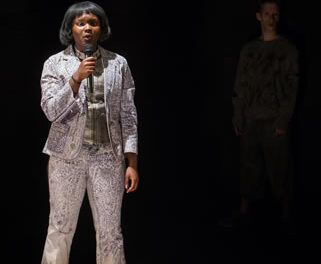I have always regarded Whitley Auditorium as the acoustical gem of the Elon University campus. With two new buildings in the old parking lot between it and Lebanon Street, it is now truly a “hidden treasure.” I found this to be an appropriate setting for this recital themed In Her Words: Women’s Poetry and Letters Set to Music. The faculty featured were soprano Julie Celona-VanGorden and pianist Christy Wisuthseriwong. The lid of Elon’s marvelously restored 1923D Steinway was fully raised. The balance between singer and keyboard was excellent throughout the performance.
A song by Paul Bowles (1910-99), American expatriate composer, author, and translator, opened the concert. He is best remembered for his sixty-odd short stories and his art song settings. His music is reputed to fit his texts like the “skin of a peach.” “Once A Lady was Here” is set to Bowles’ own text and fuses art song with jazz and popular song, alternating between 4/4 and 5/4. It struck me in parts as “bluesy.” Bowles gave this one the slinky allure of a torch song in a smoky bar. Celona-VanGorden’s operatic experience was evident throughout her recital as she embodied each song’s character. Her warm voice was evenly supported and was seamless from its languid beginning to its soaring finish. Her accompaniment fit like a glove.
There’s a fascinating genealogical background to Tales Not Told, a six-song cycle by Edward Knight (b. 1961). According to Judith Carman’s article, “Tales Not Told” in Journal of Singing, the songs are about the “lives of six American pioneer women who lived and died in extraordinary times.” All six women were direct ancestors on Knight’s maternal grandmother’s side. His wife Mary Jane Alexander did all the historic research and poetry. “Helen Paddock,” is about a Civil War widow who survived her husband by 50 years. “Patience Brewster” was an original Plymouth colonist who died of fever. Eight-year-old “Keziah Keyes” was sent for help during an Indian raid during the American Revolution. “Sarah Towne Cloyse” managed to survive the Salem Witch Trials. “Bessie Barton” was Helen Paddock’s granddaughter and the composer’s great grandmother. Quaker “Mary Dyer” is considered the first American religious martyr.
Among the highlights was “Helen Paddock” where the juxtaposition of a martial rhythm with gentle arpeggios as happier days was recalled. Celona-VanGordon’s voice and body language conveyed the two moods, and she held a concluding high note beautifully. She brought out both the childlike point of view and drama of “Keziah Keyes.”
The six songs of Fiançailles pour rire (1939) by Francis Poulenc (1899-1963) set poetry of Louise de Vilmorin. The composer wrote these while he was waiting to be called up at the start of World War II. The poet was entrapped in her castle in Hungary. Poulenc wanted to capture the bittersweet, sly, and playful color of the poet. He considered these to be elegant, nostalgic, and truly feminine. The songs are 1. “La dame d’André” (André’s lady friend), 2. “Dans l’herbe” (In the Grass), 3. “Il vole” (He flies), 4. “Mon cadaver est doux comme un gant” (My corpse is as limp as a glove), 5. “Violon” (Violin), and 6. “Fleurs” (Flowers). Celona-VanGordon’s diction was immaculate as was her refined use of color. She captured the mood of each poem whether witty in No. 1, mercurial & speedy in No. 3, or mournful or prayful in the unusually titled No. 4. Wisuthseriwong’s keyboard palette was as refined.
Besides the feminist focus of this program, its major attraction was a song cycle by Libby Larsen (b. 1950), a composer who has been very active in the Triad. She had an extended residency at the University of North Carolina Greensboro in October 2005 which led to the commissioning and world premiere of her opera, Picnic, a setting of William Inge’s play in 2009. This was part of the celebration of the restoration of the then still-named Aycock Auditorium.
Larsen describes her song cycle, Try Me, Good King, as “a group of five songs drawn from the final letters and (execution site) speeches of Katherine of Aragon, Anne Boleyn, Jane Seymour, Anne of Cleves, and Katherine Howard,” all wives of Henry the VIII. Larsen interwove elements of lute songs into each selection. John Dowland is used in the first, second, and last song. One by Michael Praetorius is used in “Jane Seymour” and one by Thomas Campion in “Anne of Cleves.”
“Two other musical gestures unify the songs. Firstly, the repeated note, which recalls the lute and creates psychological tension. The second…is abstract bell-tolling, which punctuates each song and releases the spiritual meaning of the words,” noted Larsen. The composer regards these intimate crises as monodramas of anguish and power.
The instrumental evocations of lute and death knell were immediately heard in the keyboard opening of “Katherine of Aragon.” Celona-VanGordon unleashed a myriad of emotions in the very dramatic, raging “Anne Boleyn.” She underlined the irony of “Anne of Cleves” who was divorced from Henry and lived on as “his sister.” Wisuthseriwong followed ever twist and turn of Larsen’s clever score.
Having recently reviewed a local musicians’ recording of chamber music of Gwyneth Walker (b. 1947), I looked forward to hearing a selection of the last three songs from her six-song cycle La Ternura: No. 4 “Con Tal Que Duermas” (If You’ll Only Go to Sleep), 5. “La Madre Triste” (The Sad Mother), and 6. “Carro del Cielo” (The Carriage from Heaven). The poet is the Chilean Gabriela Mistral. Arranged as songs from mother to son, they mix the personal with the ever-present threat of the political climate. Celona-VanGordon spun out these unsettling lullabies with excellent enunciation and great care for vocal shading.
This was a superb recital. Celona-VanGordon has added dramatic weight to her quiver of superb support across a wide range from an unusually solid lower to a seamless, precise high. Her voice has blossomed since her outstanding Lakmé in a 2005 UNCG student production. A solo piano recital, perhaps French and Latin repertoire, would be welcome from Wisuthseriwong.













